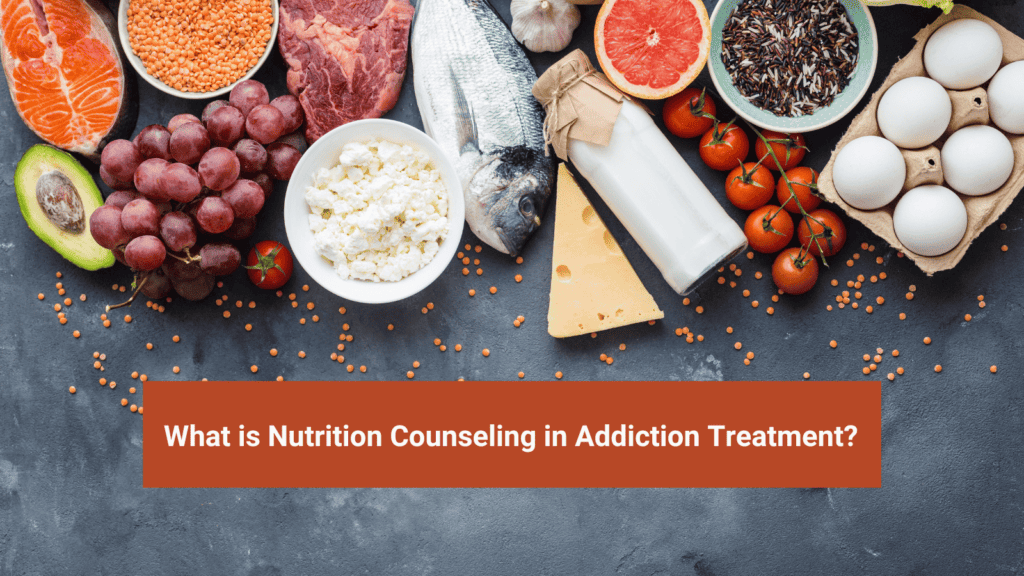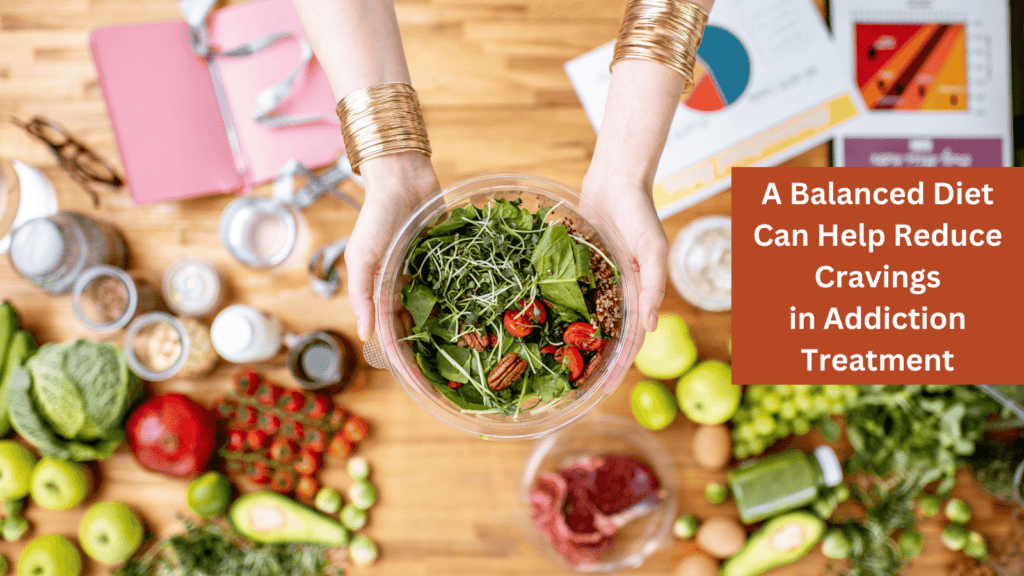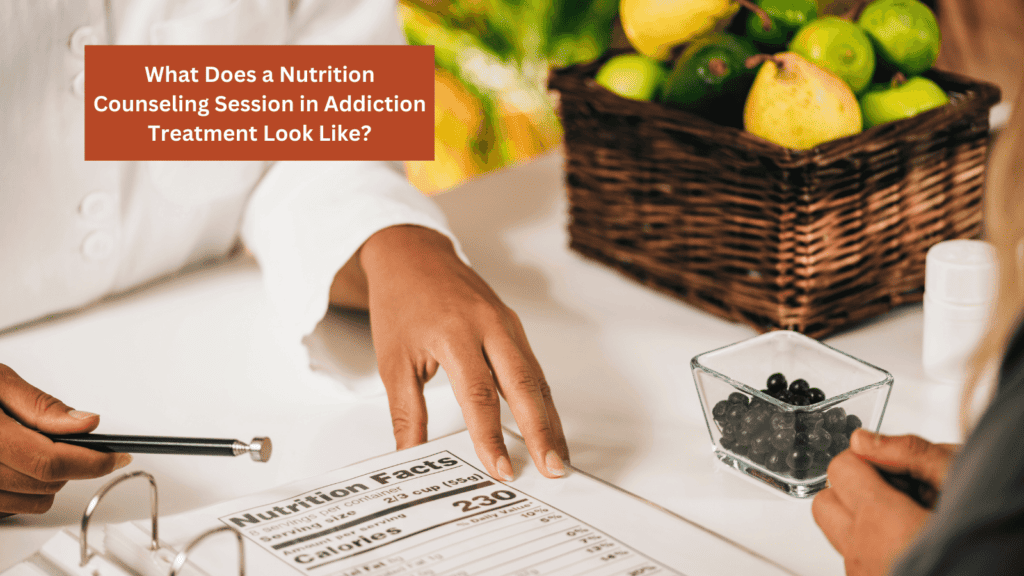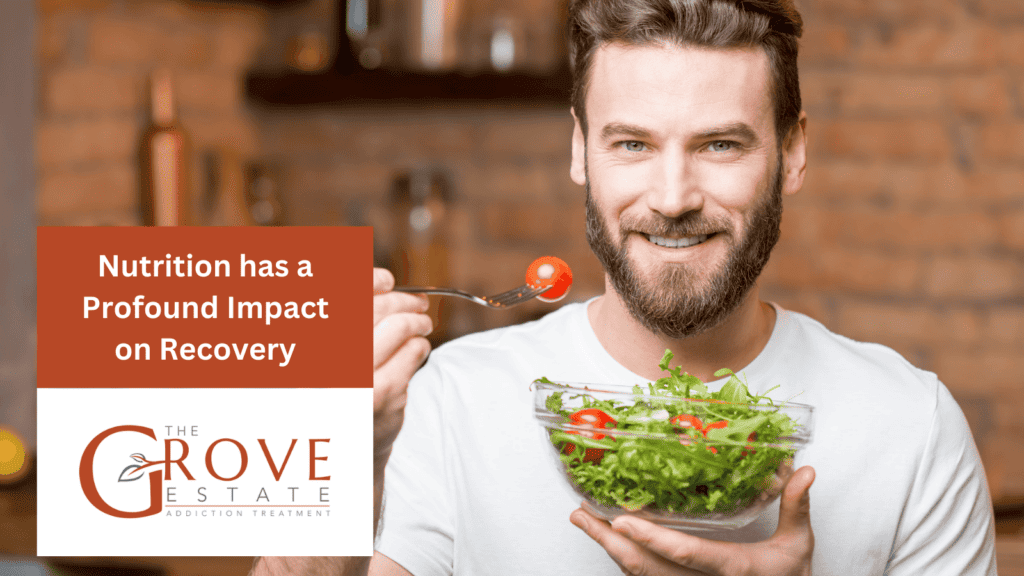When exploring addiction treatment and recovery options, the importance of nutrition is frequently overlooked. Commonly, the primary focus is on urgent needs such as detoxification, psychological therapy, and relapse prevention. Yet, the role of nutrition counseling is gaining recognition as an essential element of holistic addiction treatment. Substance abuse often results in significant nutritional deficiencies and health issues, impacting both physical well-being and mental health recovery. This growing awareness highlights the need to integrate nutritional support as a fundamental part of the recovery journey.
Malnutrition, weight loss, and deficiencies in essential vitamins and minerals are common among individuals struggling with substance abuse. For instance, according to the Journal of the American Dietetic Association, over 70% of individuals with alcohol dependence have been found to suffer from some form of nutritional deficiency. Integrating nutrition counseling into addiction treatment helps address these deficiencies, supports the body’s repair processes, and establishes a foundation for long-term recovery.

What is Nutrition Counseling in Addiction Treatment?
Nutrition counseling is a strategy used in addiction treatment to help individuals understand and implement healthy eating habits as they recover from addictive behaviors. Addiction is a chronic relapsing disease where users value the drug over any negative consequences, which can include negative health and eating habits. Nutritional counseling assesses individual dietary needs, provides education on healthy eating habits, and helps to develop personalized nutrition plans. By focusing on nutrition, individuals in recovery can improve their physical well-being, which is closely tied to mental and emotional health, thus enhancing the overall effectiveness of addiction treatment and supporting sustained recovery. As the understanding of the interplay between nutrition and addiction grows, more addiction treatment programs are incorporating nutrition counseling as a critical component of holistic recovery approaches.
Why is Nutrition Important in Addiction Recovery?
Nutrition plays a crucial role in addiction recovery for several interconnected reasons:
- Repairing the Body: Substance abuse can lead to significant physical damage, including organ damage, weakened immune system, and general deterioration of health. Proper nutrition helps in repairing tissues and organs damaged by the toxic effects of substances. For example, proteins rebuild damaged tissues, vitamins and minerals support the function and repair of cells, and antioxidants help reduce oxidative stress.
- Boosting the Immune System: Many individuals suffering from substance abuse disorders have weakened immune systems, making them more susceptible to infections and illnesses. A nutritious diet rich in vitamins, minerals, and other nutrients can strengthen the immune system, helping the body defend against diseases more effectively. This aspect is particularly crucial in early recovery when the body is still vulnerable.
- Improving Mood and Mental Health: Nutrition has a direct impact on brain health and function, affecting mood, anxiety levels, and overall mental well-being. For instance, deficiencies in certain nutrients like omega-3 fatty acids, vitamins, and minerals can lead to depressive symptoms or exacerbate them. By ensuring a balanced intake of these nutrients, individuals can experience improved mood and better mental health, which is important for maintaining the motivation and positive outlook needed for recovery.
- Decreasing Cravings: Poor nutrition can lead to fluctuations in blood sugar levels, which can cause mood swings and cravings. Also certain amino acids and nutrients can help in the production of neurotransmitters like serotonin and dopamine, which are often disrupted by substance abuse. By restoring these levels, nutrition can help reduce the psychological urge to use substances.
- Supporting Overall Health: Beyond targeting specific issues, good nutrition improves overall health, which can make the recovery process more comfortable and less physically taxing. It can increase energy levels, improve sleep quality, and enhance the body’s ability to tolerate and recover from treatment, whether that’s medication, therapy, or other interventions.
- Establishing Healthy Routines: Developing a routine around meal planning, cooking, and eating can also provide structure and a sense of normalcy during the often tumultuous period of recovery. It can offer tangible daily goals and achievements, contributing to a sense of progress and control.
What are Common Nutritional Deficiencies in those with Substance Addictions?
Individuals with substance addictions often experience a range of nutritional deficiencies due to poor dietary habits, the direct impact of substances on the body’s ability to absorb and utilize nutrients, and lifestyle factors that neglect health. Here are some common nutritional deficiencies seen in those with substance addictions:
- Vitamin Deficiencies:
- B Vitamins: Particularly thiamine (B1), niacin (B3), pyridoxine (B6), and cobalamin (B12) are commonly deficient. B vitamins are crucial for energy production and nervous system health. Alcohol, for example, significantly impairs B1 absorption and can lead to serious neurological issues.
- Vitamin C: Often low in individuals with substance addiction, leading to weakened immune system and slower healing.
- Vitamin D: Insufficient Vitamin D levels are common, affecting bone health, mood, and immune function.
- Mineral Deficiencies:
- Calcium: Essential for bone health and nerve function, often depleted in individuals with alcoholism.
- Magnesium: Deficiency is common and can result in muscle weakness, cramps, and abnormal heart rhythms.
- Iron: Iron deficiency can lead to anemia, especially in individuals with alcohol use disorders, as alcohol can lead to gastrointestinal bleeding and poor iron absorption.
- Zinc: Often low in those with alcohol and drug addictions, impacting immune function, wound healing, and sense of taste and smell.
- Protein-Energy Malnutrition: Substance abuse can lead to an overall inadequate intake of calories and protein, contributing to weight loss and muscle wasting. This is especially common in individuals who use stimulants or opioids, as these substances can suppress appetite and disrupt metabolic processes.
- Fatty Acid Imbalance: There can be an imbalance in the consumption of essential fatty acids, affecting brain health, inflammation levels, and overall cellular function.
- Dehydration and Electrolyte Imbalance: Substances like alcohol and certain drugs can lead to dehydration and imbalances in electrolytes such as sodium, potassium, and chloride, which are critical for nerve and muscle function.
- Gastrointestinal Issues: Substance abuse can cause a range of gastrointestinal problems, from decreased absorption of nutrients to damage to the lining of the stomach and intestines, further exacerbating nutritional deficiencies.
The specific nutritional deficiencies can vary based on the substance of abuse and the individual’s overall health, diet, and lifestyle. For instance, chronic alcohol abuse is particularly notorious for causing significant nutritional deficiencies due to its impact on digestion, absorption, storage, and excretion of nutrients. Similarly, individuals using stimulants might experience severe weight loss and malnutrition due to reduced appetite and increased metabolic rate.
Addressing these deficiencies is an essential part of the recovery process. It typically involves a comprehensive assessment of nutritional status, followed by a tailored nutrition plan that includes balanced meals, supplements as needed, and strategies to encourage healthy eating habits. The goal is not only to correct deficiencies but also to promote overall well-being and equip individuals with the knowledge and skills they need to maintain a healthy diet long term.
How Does Nutrition Counseling Aid in Addiction Recovery?
Nutrition counseling plays a multifaceted role in aiding addiction recovery, focusing on both the physical and psychological aspects of health. Here’s how it contributes to the recovery process:
- Assessment of Nutritional Status: Nutrition counseling begins with a thorough assessment of the individual’s current dietary habits, health status, and specific nutritional deficiencies. This assessment provides a baseline from which to work and targets areas of need. Understanding the extent of malnutrition or specific deficiencies helps in developing a personalized and effective nutrition plan.
- Correction of Nutritional Deficiencies: Based on the assessment, nutrition counseling aims to correct deficiencies through diet and sometimes supplements. This might involve increasing the intake of certain foods, reducing or eliminating others, and possibly using vitamin and mineral supplements to address specific deficits. Correcting these deficiencies helps improve physical health, which is often compromised in individuals with long-term substance use.
- Education on Balanced Diet: Counselors educate individuals on the importance of a balanced diet and what that entails. This education includes understanding macronutrients (proteins, fats, and carbohydrates) and micronutrients (vitamins and minerals), their food sources, and their role in the body. Individuals learn how to read food labels, understand portion sizes, and make healthier food choices. The aim is to equip them with the knowledge to make informed decisions about their diet beyond the recovery period.
- Developing a Healthy Relationship with Food: Substance abuse can lead to disordered eating habits and an unhealthy relationship with food. Nutrition counseling helps address these issues by encouraging a healthier approach to eating. This might involve regular meal planning, mindful eating practices, understanding hunger and fullness cues, and strategies to cope with cravings. By fostering a positive relationship with food, individuals can use nutrition as a tool for recovery rather than an additional source of stress.
- Improving Mental Health: Nutrition significantly impacts mental health. Deficiencies in certain nutrients can exacerbate feelings of depression and anxiety, while a healthy diet can improve mood and cognitive function. Nutrition counseling can help individuals understand the food-mood connection and how to use diet to support mental well-being.
- Building Life Skills and Autonomy: Part of nutrition counseling involves teaching practical skills like grocery shopping, reading labels, cooking, and meal planning. These skills not only contribute to better nutrition but also enhance the individual’s sense of autonomy and competence, important factors in building a life after addiction.
- Supporting Long-term Recovery Goals: Nutrition counseling is not just about addressing immediate nutritional needs; it’s also about setting the stage for long-term health and recovery. By integrating healthy eating habits into their lifestyle, individuals in recovery can better manage stress, reduce the risk of relapse, and improve their overall quality of life.
- Tailoring to Individual Needs: Each person’s journey with addiction and recovery is unique, and so are their nutritional needs. Nutrition counseling takes into account the individual’s preferences, lifestyle, and any co-occurring health issues to create a realistic and sustainable dietary plan.

Can Improving Nutrition Reduce Cravings for Drugs or Alcohol?
Improving nutrition can significantly reduce cravings for drugs or alcohol by stabilizing blood sugar levels, enhancing brain chemistry, and reducing overall physical stress, thereby supporting a more effective and sustainable recovery. A balanced diet helps to stabilize these levels, reducing sudden hunger or mood swings that might trigger a craving. Furthermore, proper nutrition supports optimal brain chemistry, replenishing nutrients needed for the production of neurotransmitters associated with mood and well-being. This improvement in brain function can help alleviate the desire for substances that individuals might have used to self-medicate or enhance mood.
Additionally, as the body heals from the physical stress of addiction and withdrawal, a healthy diet can provide the energy and nutrients needed for recovery, reducing the body’s stress response and, by extension, cravings for a quick chemical fix. In essence, while improving nutrition isn’t a standalone solution for substance cravings, it’s a powerful tool in a comprehensive recovery strategy, contributing to more manageable and less intense cravings.
Are there Specific Diets Recommended for Those in Addiction Recovery?
There isn’t a one-size-fits-all diet for individuals in addiction recovery, as nutritional needs can vary widely depending on the substance of abuse, the extent of the addiction, and the individual’s overall health. However, some general dietary recommendations are often made to support recovery:
- Balanced Diet: A diet that includes a variety of foods from all food groups — fruits, vegetables, lean proteins, whole grains, and healthy fats — to ensure a wide range of nutrients.
- Regular Meals: Eating at regular intervals to maintain blood sugar levels, which can help reduce cravings and mood swings.
- Hydration: Encouraging adequate fluid intake, especially water, to help with detoxification processes and overall hydration.
- High-Quality Proteins: Including lean meats, fish, eggs, dairy, or plant-based sources to help repair body tissues and support neurotransmitter production.
- Complex Carbohydrates: Such as whole grains, legumes, and vegetables to provide sustained energy and fiber.
- Vitamins and Minerals: Ensuring sufficient intake of essential vitamins and minerals, possibly including supplementation as recommended by a healthcare provider.
- Omega-3 Fatty Acids: Found in fish, flaxseed, and walnuts, which are important for brain health and may help improve mood.

What Does a Nutrition Counseling Session in Addiction Treatment Look Like?
A nutrition counseling session in addiction treatment typically involves an initial assessment of the individual’s dietary habits, health history, and specific nutritional needs. The counselor then provides education on the importance of nutrition in recovery, including how to choose and prepare healthy foods. Together, the counselor and individual will set realistic dietary goals and develop a personalized meal plan. The session may also include strategies for addressing barriers to healthy eating, such as managing cravings or changing long-standing eating behaviors. The aim is to equip the individual with knowledge and skills to improve their dietary habits, supporting their overall recovery journey.
Can Nutrition Counseling Be Personalized for Different Types of Addiction?
Nutrition counseling can and should be personalized for different types of addiction, as various substances affect the body and its nutritional needs in distinct ways. Here’s how nutrition counseling is tailored to meet the unique challenges of different types of addiction:
- Alcohol Addiction: Alcohol can cause damage to the liver and pancreas, affect nutrient absorption, and lead to deficiencies, particularly in B vitamins, vitamin A, and minerals like calcium and magnesium. Counseling focuses on repairing organ damage, replenishing these nutrients, and ensuring adequate hydration.
- Opioid Addiction: Opioids can affect gastrointestinal health, leading to issues like constipation and poor nutrient absorption. Nutrition counseling for opioid recovery often emphasizes a diet rich in fiber, hydration, and a balanced intake of macronutrients and micronutrients.
- Stimulant Addiction (e.g., Cocaine, Methamphetamine): Stimulants can lead to reduced appetite and significant weight loss, as well as erratic eating patterns. Recovery diets focus on calorie and nutrient-dense foods to restore a healthy weight, regular meal times to stabilize blood sugar, and adequate hydration.
- Cannabis Addiction: Cannabis can increase appetite, leading to potential overeating or an unhealthy diet. Counseling might focus on establishing healthy eating patterns and choosing nutrient-rich foods.
- Prescription Drug Addiction: The approach depends on the type of medication (e.g., prescription stimulants, sedatives, or painkillers) and its specific effects on appetite, weight, and nutrient absorption. The nutrition plan is personalized to address these effects and any co-occurring disorders.
In all cases, the goal of nutrition counseling is to address the direct and indirect effects of substance abuse on the body, considering how different substances may have altered the individual’s health and nutritional status. It involves a thorough assessment of the individual’s current health, dietary habits, and preferences. The nutritionist then provides education, support, and strategies tailored to the individual’s specific recovery needs, promoting both immediate recovery and long-term health. This personalized approach ensures that the nutrition plan not only addresses general health and well-being but also targets the unique challenges posed by different types of substance addiction.
How is Nutrition Counseling Combined With Other Forms of Therapy?
Nutrition counseling is typically combined with other forms of therapy in addiction treatment to provide a comprehensive, holistic approach to recovery. Here’s how it integrates with various therapeutic modalities:
- Medical Treatment: In the initial stages of recovery, individuals might require medical intervention for detoxification or to address co-occurring health issues. Nutrition counseling can support medical treatment by ensuring the body is well-nourished for healing and can cope with the side effects of medications.
- Psychotherapy: Individual or group therapy sessions are core to addiction treatment, addressing the psychological aspects of addiction. Nutrition counseling complements psychotherapy by improving mood and cognitive function through diet, which can make individuals more receptive to psychotherapy and improve overall treatment outcomes.
- Behavioral Therapies: Cognitive-behavioral therapy (CBT) and other behavioral therapies help individuals change harmful patterns of thinking and behavior. Nutrition counseling can be part of these behavior change strategies, helping individuals develop new, healthy habits around food.
- Support Groups: Support groups provide community and peer support for those in recovery. Nutrition can be a topic of discussion in these groups, with individuals sharing strategies, challenges, and successes related to healthy eating.
- Physical and Recreational Therapies: Physical activities and therapies can help improve overall health and well-being. Nutrition counseling ensures that individuals have the energy and nutritional support to participate in these activities, which in turn can promote a healthy lifestyle and aid in recovery.
- Holistic and Alternative Therapies: Treatments such as mindfulness therapy including yoga, meditation, acupuncture, or art therapy may be part of a comprehensive addiction treatment program. Nutrition counseling supports these therapies by enhancing overall health, reducing stress, and improving focus and participation.
In all these cases, nutrition counseling is not a standalone treatment but part of a multidisciplinary approach. It’s coordinated with other treatments to ensure that all aspects of an individual’s health and well-being are addressed. The collaboration between healthcare providers, therapists, and nutritionists ensures that nutrition strategies complement and enhance other treatment modalities, leading to a more effective and sustainable recovery.

Where can you get holistic addiction treatment?
Starting the road to recovery from addiction is a journey that encompasses more than just addressing the substance abuse itself. It’s about nurturing your entire well-being, which includes the crucial aspects of nutrition and physical fitness. In Indiana, you have the opportunity to access a pioneering approach to addiction treatment that holistically addresses your needs. Our programs include nutritional counseling and exercise therapy, components often underestimated in traditional treatment plans.
Recognizing the profound impact of nutrition on recovery and integrating comprehensive nutrition counseling ensures that each individual’s journey to sobriety is supported by physical and mental rejuvenation. This holistic approach combines medical treatment, psychotherapy, behavioral therapies, and a supportive community, all underpinned by the transformative power of nutritional guidance.
Nutritional counseling in our program isn’t just about eating well; it’s about rebuilding your body, strengthening your mental health, and fostering a sustainable lifestyle change. Coupled with this, our exercise therapy offers a unique way to enhance physical health, reduce stress, and improve emotional well-being. Together, these services work seamlessly within our comprehensive addiction treatment plans, ensuring that your journey towards recovery is as complete and effective as possible.
Reach out to us today to learn more about how our holistic treatment programs in Indiana can help you or your loved ones start a new chapter in life, one where health, wellness, and recovery go hand in hand.

Share This Post



